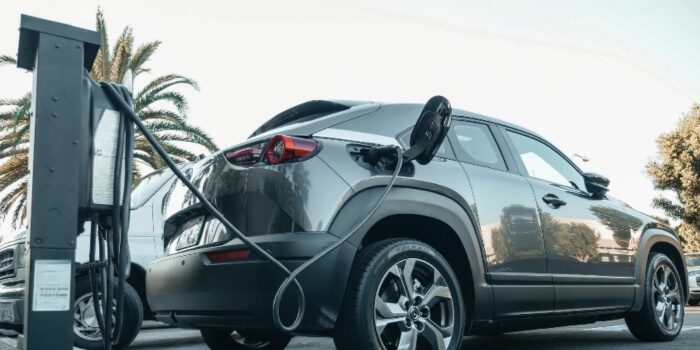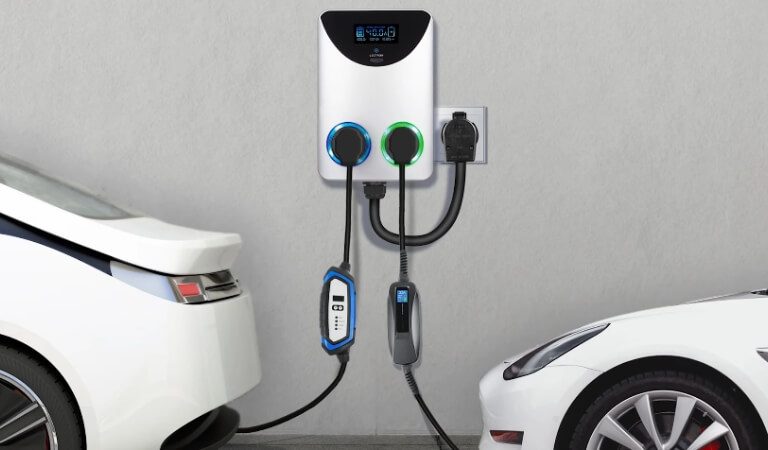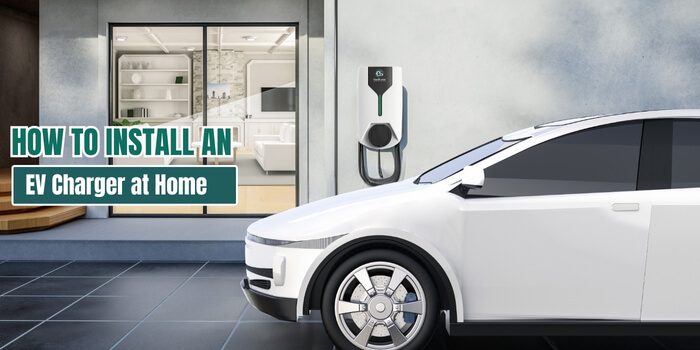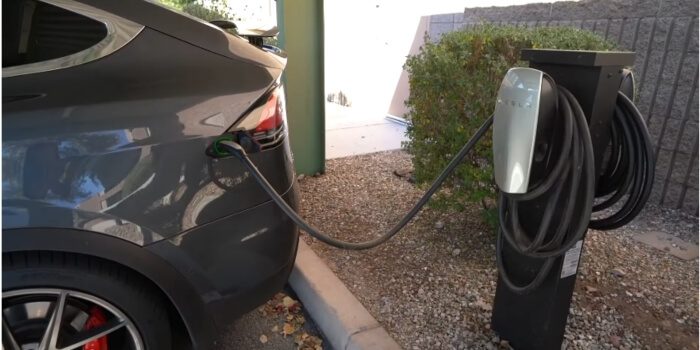Electric vehicle (EV) chargers are becoming household staples as more people switch to sustainable driving options. For that, you might wonder, “Can I wire the EV charger myself?”
While the DIY approach is tempting, it’s crucial to understand the complexities and risks involved. Wiring an EV charger is not just about connecting a few wires. It involves dealing with high-voltage live currents that can endanger your safety and your home if not handled properly.
Unless you’re a certified electrician, it’s best to avoid DIY installations. But don’t worry! Stick with us as we guide you through safer alternatives to powering up your electric ride.
A Quick Overview of EV Chargers in Bangladesh
In Bangladesh, the electric vehicle (EV) market is gaining momentum, sparking interest in EV chargers. Infrastructure development is underway, aiming to support this eco-friendly transition. Consumers are increasingly curious about how they can charge their vehicles efficiently at home.

Charging stations are popping up in urban areas, making it easier for EV owners to stay powered. These stations vary from slow to fast charging, catering to different needs. However, the network is still expanding, especially outside major cities.
Adoption rates for EVs in Bangladesh are expected to rise as awareness grows. The government is implementing policies to encourage this shift. For prospective EV owners, understanding charger types and locations is becoming essential.
Types of EV chargers You Can Find in Bangladesh
Bangladesh is embracing the electric vehicle revolution, bringing various EV chargers into the spotlight. As the demand for cleaner transportation grows, so does the infrastructure. Here’s a look at the types of EV chargers available in the nation.
Level 1 Chargers
These are the standard chargers that come with most electric vehicles. Level 1 chargers are perfect for overnight use, providing a slow but steady charge. They plug into typical household outlets, making them highly accessible. However, they’re not the fastest option available.
Level 2 Chargers
A step up, Level 2 chargers offer a quicker charging solution. These require a special installation but significantly reduce charging time. They’re ideal for home and public settings, bridging the gap between convenience and speed. Many businesses in Bangladesh are adopting these for customer and employee use.
DC Fast Chargers
DC Fast Chargers represent the pinnacle of EV charging technology. They provide rapid charging, making them perfect for commercial and highway locations. Although less common, they’re expanding across Bangladesh, particularly in urban areas. These chargers drastically reduce waiting times, enhancing user convenience.
The landscape of EV charging in Bangladesh is evolving, reflecting global trends towards sustainability. Whether you own an EV or are considering one, understanding these charger types will enhance your driving experience. As infrastructure grows, expect more accessible and efficient charging solutions nationwide.
Can I Wire the EV Charger Myself?
Wiring an EV charger yourself is a cost-effective solution, but it’s not as straightforward as it appears. Safety and expertise are paramount when dealing with electrical installations. Therefore, it’s essential to evaluate several factors before proceeding.

Here are the factors you should consider while installing an electric vehicle charger at home:
Professional Certification and Expertise
Handling electrical systems requires a deep understanding and specific skill set, typically beyond the reach of standard DIY projects. Certified electricians are trained to navigate complex wiring systems, adhere to local building codes, and implement safety standards effectively.
This expertise helps prevent improper installations, which can lead to electrical malfunctions or hazards. By relying on certified professionals, you ensure that your EV charger is installed correctly, efficiently, and safely, avoiding potential legal and insurance issues.
Understanding Your Electrical Capacity
Your home’s electrical infrastructure is designed to handle a specific load, and adding an EV charger introduces additional demand. Before installation, assessing whether your current system can support this new appliance without risking overload is crucial.
A professional can evaluate your home’s electrical capacity, recommend necessary upgrades, and ensure that your system can safely accommodate the charger. Ignoring this step could result in circuit breakers tripping, power outages, or even more severe electrical problems.
Choosing the Correct Equipment
Selecting the suitable EV charger involves more than just picking one off the shelf; it requires understanding your vehicle’s specific needs and your home’s electrical system. There are different levels of chargers, each with varying power outputs and charging speeds, and not all are compatible with every vehicle or electrical setup.
Moreover, proper installation materials and tools are crucial to ensure that the charger functions correctly and safely. Consulting with a professional like CrackPlatoon can help you make an informed decision, ensuring your charging station’s compatibility, efficiency, and longevity.
Safety Measures and Compliance
Electrical installations come with inherent risks, including fire hazards and the risk of electrocution. Professional installers are trained to implement necessary safety measures such as proper grounding, circuit protection, and secure mounting.
They also ensure that the installation complies with all local, state, and national electrical codes and standards. This compliance is not just about following the law; it’s about ensuring that your EV charging station is safe to use every day, protecting you, your family, and your property.
While the notion of installing an EV charger by oneself might seem like a cost-saving measure, the risks and complexities involved significantly outweigh potential savings. Professional installation ensures that the job is done safely, correctly, and in compliance with all relevant regulations, providing peace of mind and safeguarding your investment in your electric vehicle and your home.
How to Install an EV Charger at Home?
The installation of an EV charger at home is one of the most exciting steps toward adopting electric mobility. A great deal of planning is involved in this process, as well as adherence to safety regulations. You should consult with a professional, such as CrackPlatoon, for assistance with the specifics.

However, here is a general overview to get you started:
Step 1: Assessment of Electrical System
Before anything else, evaluate your home’s electrical capacity to handle the new load. This involves checking your current electrical system and panel to ensure they can support the charger. Consulting a professional electrician or a service like CrackPlatoon can help you understand your system’s capabilities and necessary upgrades.
Step 2: Selecting the Right Charger
Choosing the appropriate EV charger is crucial based on your vehicle’s requirements and your charging speed preference. Consider factors such as amperage, voltage, and whether you want a Level 1 (slow) or Level 2 (faster) charger. Professionals from CrackPlatoon can assist in selecting a charger that aligns with your needs, ensuring compatibility and efficiency.
Step 3: Obtaining Permits
Depending on your location, you may need to obtain permits before installing an EV charger. This step ensures that your installation meets local building and electrical codes. Consult with your electrician or a service like CrackPlatoon to navigate the permitting process smoothly.
Step 4: Installation Process
Hire a certified electrician or a specialized service like CrackPlatoon to install the charger. They will mount the unit, run the necessary wiring from your electrical panel, and make all the required connections. Ensure that all work done follows national and local electrical codes for a safe installation.
Step 5: Final Inspection and Testing
After installation, a final inspection might be required to ensure everything is up to code. Once approved, test the charger with your electric vehicle to confirm it works correctly. If you encounter any issues, consult with your installer immediately to address them.
Installing an EV charger at home is a significant yet manageable task that boosts your transition to electric driving. By following these steps and consulting with professionals like CrackPlatoon, you can ensure a smooth, safe, and efficient setup. You should remember that professional guidance is key to navigating the technical and regulatory complexities of EV charger installation.
Benefits of Having Your Own EV charger
The presence of an electric vehicle (EV) charger at your residence brings numerous advantages to your daily life. It not only enhances the convenience of EV ownership but also promotes a more sustainable lifestyle.
Here are the benefits of having a personal EV charger:
Convenience and Time-Saving
With your own EV charger means you can recharge your vehicle overnight, just like your smartphone. You’ll avoid queues at public charging stations, saving you valuable time and effort.
This convenience allows for stress-free mornings with a fully charged vehicle ready to go. It transforms your vehicle’s downtime into productive charging time, enhancing your daily routine.
Cost Efficiency
Electric vehicle charging at home is typically cheaper than public charging stations, especially if you charge overnight during off-peak hours. You can effectively manage your electricity usage, taking advantage of lower rates.
Over time, the savings from home charging can significantly offset the initial installation cost. Moreover, owning an EV charger can increase your property value, making it a wise investment.
Increased Safety and Security
When you charge at home, it reduces the risk associated with using public charging stations, such as vandalism or electrical faults. You can safely charge your EV in your garage or driveway under your supervision.
The setup minimizes wear and tear on your EV’s battery by maintaining consistent charging habits. Plus, you avoid the potential hazards of charging in poorly lit or less secure public areas.
Environmental Impact
You should use your own EV charger to support the shift towards green energy, especially if you pair it with renewable energy sources. By charging your vehicle at home, you can take advantage of green energy tariffs or even your own solar panels.
This reduces your carbon footprint and contributes to a cleaner environment. Personal chargers also help reduce the strain on public charging infrastructure, making EVs more sustainable for everyone.
A personal EV charger at home provides unmatched convenience, cost savings, safety, and environmental benefits. It enhances your daily electric vehicle experience but also supports broader sustainability goals. With these advantages in mind, the decision to invest in your own EV charging station becomes not just practical but also a step towards a more sustainable future.
Essential Tips to Adopt a Good Charging Habit for Your Electric Vehicle
The adoption of proper charging habits for your electric vehicle (EV) is crucial for extending battery life and enhancing performance. Like any device, your EV thrives on consistent and mindful care.

Here are some essential tips to help you get the most out of your electric vehicle by adopting effective charging practices:
- Charge Regularly: Avoid letting your battery deplete completely; regular charging protects battery health. Aim to keep your battery level between 20% and 80% for optimal performance.
- Use Timers: Charge during off-peak hours. This reduces electricity costs and strain on the grid, benefiting both your wallet and the environment.
- Temperature Considerations: Charge your EV at moderate temperatures when possible. Extreme heat or cold can affect battery efficiency and lifespan negatively.
- Scheduled Charging: Establish a consistent charging routine, similar to refueling a conventional car. This ensures your EV is always ready when you need it, without overcharging.
- Avoid Fast Charging: Use fast chargers only when necessary, as they strain the battery. Regular standard charging maintains battery health longer.
- Monitor Battery Health: Keep an eye on your EV’s battery condition and charging patterns. Use your vehicle’s app or dashboard features to track battery health and adjust your habits accordingly.
- Limit Full Charges: Avoid charging the battery to 100% unless you are going on a long trip. Frequent full charges wear out the battery faster.
- Stay Informed: Stay updated with your EV manufacturer’s recommendations and software updates. They often include optimized charging strategies and improvements.
Taking care of your electric vehicle with appropriate charging habits prolongs your battery life and also ensures your EV runs efficiently. With these tips, you can enjoy a smoother, cost-effective driving experience. Remember, taking care of your EV’s battery is just like taking care of the vehicle itself – it requires attention and consistency.
FAQs about Can I Wire EV Charger Myself?
Installing an EV charger involves electrical knowledge and safety considerations. Many homeowners ponder whether they can undertake this task themselves. Here are a few relevant FAQs to provide clarity on self-installing an EV charger:
Can I Legally Install an EV Charger Myself?
Legally, you might be allowed to install an EV charger yourself, but it depends on local regulations and codes. Typically, electrical work, including EV charger installation, requires a certified electrician to ensure safety and compliance with local electrical codes.
Do I Need Special Tools to Install an EV Charger?
Yes, installing an EV charger requires specific electrical tools and knowledge, including circuit testers, wire strippers, and possibly conduit benders. Without the correct tools and expertise, you risk improper installation and safety hazards.
How Do I Know if My Electrical System Can Support an EV Charger?
You must assess your home’s electrical capacity, which involves understanding your current electrical load and ensuring your system can handle the additional demand. This usually requires a professional evaluation to avoid overloading your system.
What Are the Risks of Installing an EV Charger Myself?
Risks include electrical shock, fire hazards, damaging your home’s electrical system, and voiding warranties on your EV charger or home insurance policies. Improper installation can also lead to inefficient charging and potential harm to your vehicle.
Can Self-Installing an EV Charger Affect My Insurance?
Yes, self-installing an EV charger without proper certification can void parts of your home insurance policy. If the installation leads to damage or a fire, your insurance may not cover the costs due to unauthorized electrical work.
Endnotes
There are many exciting new practices and considerations involved in owning an electric vehicle in Bangladesh or elsewhere. It is educational and beneficial to become familiar with the types of electric vehicle chargers available and adopt good charging habits.
However, regarding the question, “Can I wire the EV charger myself?” the importance of relying on professional expertise cannot be overstated. Certified technicians ensure safety, efficiency, and compliance with local codes, providing peace of mind.
You should make informed decisions about the future of driving and seek professional assistance if necessary to ensure a smooth and safe transition to electric vehicles.
